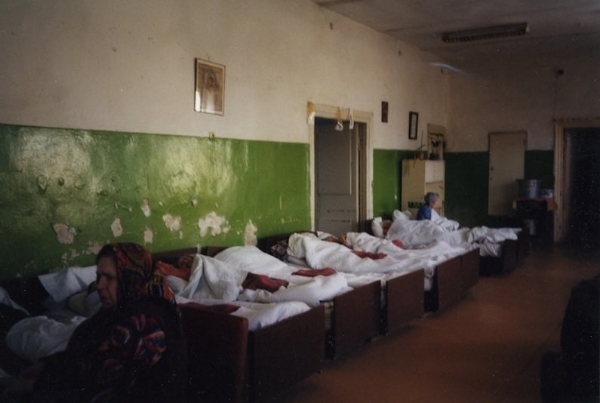Press Release
GOETHEANUM
MOSCOW REGIONAL PSYCHIATRIC HOSPITAL
Jake Zervudachi
2 May - 4 Jun, 2010
Jake Zervudachi talks to Alice Pfeiffer for Dazed & Confused about his solo show at Don’t Projects:
Dazed Digital: You are completely self-taught, and come from a design background. How did you end up in film?
Jake Zervudachi: Well, I always wanted to work with images. I guess my first step was to quit art school, which I went to for a year and was fairly disappointed by. At the time I think I just wanted to get out of the traditional education system, I moved to Paris and worked in an Interior Design company for a couple of years. At this time, I rediscovered many films with more understanding, particularly the work Tarkovsky, which was a great inspiration for me. I began making small films at this time. It just turned out that film was the medium that was most suited to what I wanted to show.
DD: You are partly Russian, and seem fascinated with the country. Why is that?
JZ: My grandmother is Russian and I had always been drawn to the country. I was fascinated by her stories of her flight as an immigrant as a young girl after the fall of the Tsarist government. She was the one who introduced me to the Psychiatric Hospitals I have looked at in my work. Originally she was working with a charity helping an orphanage that had been set up in one of the old family country houses outside Moscow – through the people there she was made aware of this provincial psychiatric hospital, ‘Moscow Regional Psychiatric Hospital #2’, that had been more or less forgotten for the last 50 years or so and was literally crumbling away and in desperate need of help. It was originally designed for 500 patients but there are now over 2000 beds, many lined up in the corridors and in a terrible condition, it seemed these people had been put here and forgotten by everyone.
DD: Is that why you decided to make a film about the hospital?
JZ: Not only. I did some research into the history of the hospital and found it also had a very interesting story. Founded toward the end of the 19th century, it’s principle organizer was the celebrated psychiatrist Vladimir Yakovenko, famous in Russia for his progressive and altruistic methods in dealing with the mentally ill, but little known elsewhere. I also discovered many other connections here. Anton Chekhov had been the local doctor in a nearby village and would send patients to his friend and contemporary Yakovenko. He visited the hospital often and even staged theatre performances there, inviting actors from Moscow, for the staff and patients of the hospital.
Tolstoy also visited the hospital with his daughter and once watched a film there with the patients.
I also managed to track down Yakovenko’s great granddaughter, Olga, who was a truly great help to me with the project, with a great amount of knowledge of her great grandfathers work and the hospital. The videos of the karaoke performances show patients at a neighboring psychiatric prison hospital I was taken to by the head doctor of Hospital #2.
DD: Your work also demonstrates an interest in philosopher Rudolf Steiner. Although you don't want to be labeled as a Steiner-obsessed artist, what about him and his work inspire you? Why do you chose to interact with his work via the medium of film?
JZ: Again, this began with a somewhat nostalgic connection for me. I went to a Steiner-Waldorf school up till about 11 years old, I have pretty good memories of that. At the school, certainly at this age, you do not hear anything about Rudolf Steiner the man, or directly about the ideas behind his philosophical worldview – Anthroposophy, (of course not at 11), so it was about 10 years later that curiosity about my early ‘formation’ led me to read Steiner’s fundamental philosophical work The Philosophy of Spiritual Activity. The book was quite hard work but I found a lot of great interest here. His worldview takes a firm standpoint, which allows for man’s spiritual development, showing that a purely materialistic position to explain society and mankind is impossible. In any case, while I am not a particular follower of Steiner and have only touched upon his work, I think his philosophical ideas do deserve some attention.
On top of this I am very interested in Steiner's artistic impulse - in architecture, sculpture, colour theory and eurhythmy - the art of movement he developed as 'visible speech - visible music'. So I was also interested in the Goetheanum purely as an esthetic subject. But both these films are, so to speak "research films" and they are both on going projects. At this stage they are very much works in progress. My ‘big’ project is to make a biographical film, so I guess this is all research that will one day lead to that… I hope.
DD: What are you trying to achieve through film? Is it at core, a documentary-based or art-based aim?
JZ: While primarily I set out to make fiction films or at least carefully composed, staged and controlled films with actors etc, which actually is still often the case now, there are certain element that draw me towards a more documentary - that is to say using real life subjects and situations rather actors and sets - approach to filmmaking. It is very liberating to be able to take the kind of time allowed to observe nature and people when working in this way, something you are not afforded when working with actors and a film crew. The artistic possibilities of treatment and transformation of ‘real life’ images interest me a lot. I like the idea that stories can come of it’s own out of these observations alone.
Interview in Dazed & Confused May 2010














